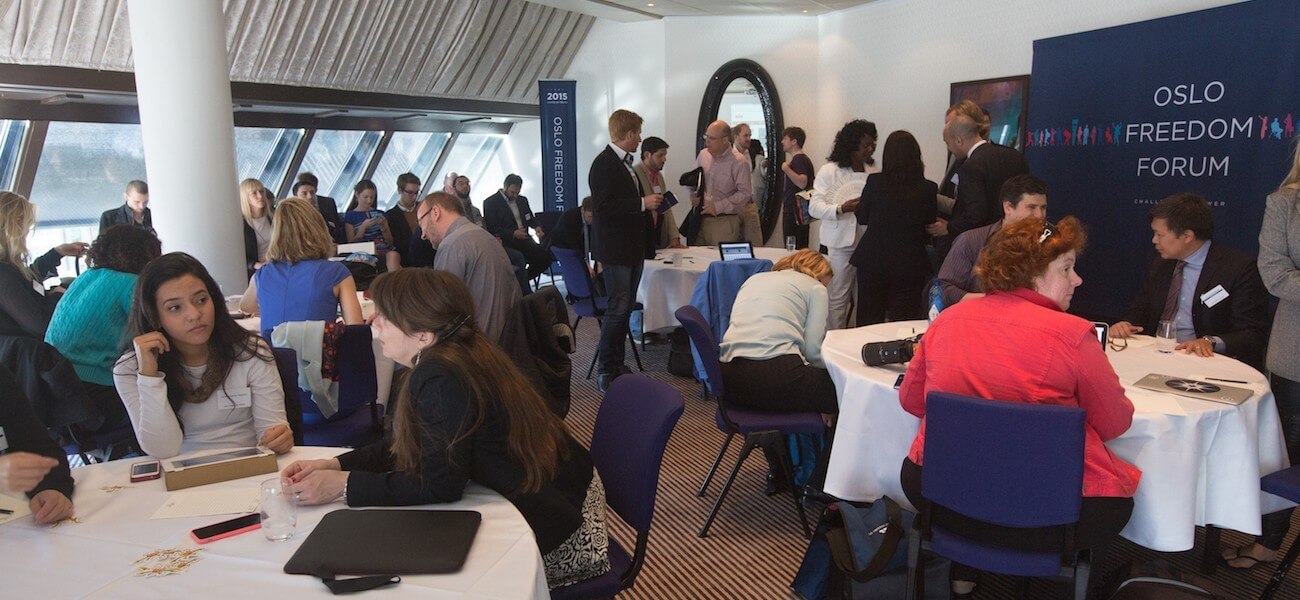
The Tech Lab took place on Monday, May 23 during the 2016 Oslo Freedom Forum.

At the Tech Lab, experts met dissidents, activists, and journalists to share their technology and learn about how they can better promote human rights and free expression with their products. Attendees stopped by to have informal conversations, schedule security assessments, and learnt how to communicate securely or circumvent censorship.

Participants at this year’s Tech Lab included:
AnchorFree is a private venture software company that provides a virtual private network (VPN) for secure web browsing. AnchorFree’s Hotspot Shield application secures all internet communications and web browsing while protecting each user’s privacy and identity online. This creates a personal, secure tunnel for each user and keeps users’ online activities, sites visited, searches, and personally identifiable information private. In regions where the internet is censored, Hotspot Shield acts as a secure gateway to the world’s information, democratizing the web.
Benetech is a nonprofit focused on developing technology for social good. Benetech was founded in 1989 by Jim Fruchterman to provide reading machines for the blind; over 11 years, more than 35,000 reading machines were sold in 60 countries, offering 12 different languages. Benetech expanded its mission in 2000 to focus on human rights activism, environmental issues, and prototyping new technologies for social good. One of their recent projects is Martus, an open source software application that allows users anywhere in the world to securely gather and organize information about human rights violations.
Cloud City Development is a full-service design and software consultancy specializing in web and mobile apps. Cloud City’s services include lean user experience and information architecture, interactive design, video and animation, and agile software development. They excel at staffing teams, building MVPs, scaling APIs, and coding Ruby on Rails. Working with innovative and diverse companies from Fortune 500s to startups and nonprofits, Cloud City actively seeks out socially responsible companies that make a positive impact in the world.
Electronic Frontier Foundation (EFF) is an international digital rights nonprofit that works to defend civil liberties in the digital world. Founded in 1990, EFF champions user privacy, free expression, and innovation through impact litigation, policy analysis, grassroots activism, and technology development. EFF draws upon the expertise of leading technologists, activists, and attorneys, forging a vast network of concerned members and partner organizations to advise policymakers and to educate the press and public using comprehensive analysis, education guides, workshops, and more.
Impassion Group is part technology design studio, part advisory and implementation outfit. Impassion Group rapidly prototypes and deploys technology for the frontiers of connectivity, and works through on-the-ground civil society organizations like Impassion Afghanistan, the country’s first digital media agency. Their current work focuses on the development of products, services, and innovative applications of mesh network and the global Sneakernet, an informal network that allows for offline person-to-person transfer of electronic content. Impassion Group works primarily in frontier markets and volatile contexts, specializing in edge-of-world geographies.
Jigsaw, formerly Google Ideas, is a product incubator dedicated to exploring how technology can be used to protect internet users in societies where censorship, corruption, and violence are daily realities. Jigsaw’s team of data scientists, engineers, and researchers focuses on building products for individuals and independent organizations to expand and protect their access to information. Jigsaw’s uProxy is one such tool enabling people to get and share access to the free and open internet. With uProxy, Jigsaw hopes to allow others to experience a safe and unrestricted internet, and to share a vision of an internet without borders.
Polaris is a nonprofit that works to eradicate human trafficking and modern-day slavery. Polaris works directly with victims, hosts tip and crisis hotlines, and offers solutions to victims of human trafficking. Polaris’s U.S. national human trafficking hotline is now regarded as one of the most effective anti-trafficking hotlines in the world. Using crowdsourced data from calls received at the hotline, Polaris has been able to identify trends and sources of trafficking within the U.S., and plans to expand this model globally.
Twitter, founded in 2006, is an online social networking service that is now one of the ten most-visited websites on the internet. As of December 2015, Twitter had 320 million monthly active users and more than 35 offices around the world. Twitter has played an essential role in human rights since its inception, often serving as a catalyst for social movements by offering person-to-person exchange, as well as on the ground news from common users. Twitter’s extensions, Periscope and Vine, allow users to stream video through the platform, a key tool for activists sharing their messages on social media.
Wickr Foundation is a global initiative that advances private communication and uncensored information with the goal of building the Private Web, where individuals own and control their conversations and information. The foundation’s current programs includes the Human Rights Security Lab, which connects security innovators with democracy activists to make technology like end-to-end encryption, anonymous browsing, and VPN accessible and intuitive. Through its Privacy Monitor initiative, the Wickr Foundation is also providing journalists from major international newsrooms with access to free privacy training to protect their communications and sources.